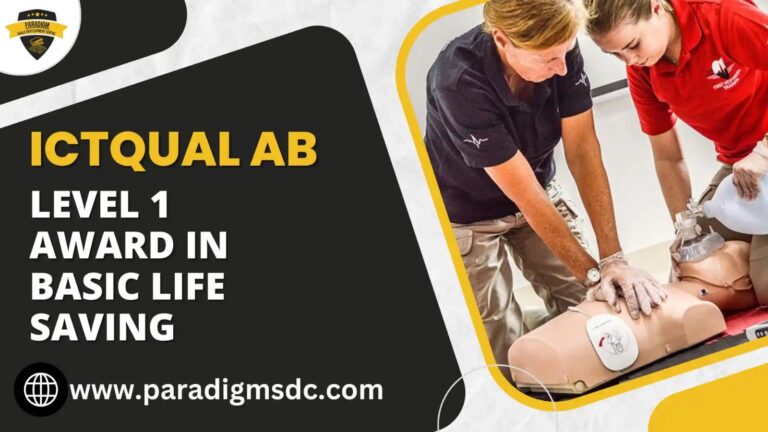Course Introduction
The ICTQual Level 3 Award in Nursing Studies – Clinical Skills: Caring for Respiratory Patients is a specialized program designed for healthcare professionals who wish to enhance their skills in managing respiratory conditions. With respiratory diseases being among the leading causes of morbidity and mortality worldwide, this course provides crucial training to ensure high-quality care for patients with respiratory issues. By combining theoretical knowledge with practical skills, this course aims to prepare nurses and healthcare providers to excel in respiratory patient care.
Course Overview
This comprehensive course offers an in-depth study of respiratory care, focusing on the clinical skills needed to manage and treat patients with respiratory conditions effectively. The curriculum covers a wide range of topics, from understanding respiratory anatomy and physiology to mastering advanced clinical techniques. Through interactive lectures, hands-on workshops, and real-life clinical scenarios, students will gain the confidence and competence required to provide exceptional care to respiratory patients.
Course Study Units
- Anatomy and Physiology of the Respiratory System
- Common Respiratory Conditions
- Principles of Respiratory Care
- Oxygen Therapy
- Airway Management
- Medication Administration for Respiratory Care
- Patient-Centered Care and Communication
- Legal and Ethical Considerations in Respiratory Care
Learning Outcomes
Upon completing the ICTQual Level 3 Award in Nursing Studies – Clinical Skills: Caring for Respiratory Patients, students will be able to:
Anatomy and Physiology of the Respiratory System
- Demonstrate a comprehensive understanding of the structure and function of the respiratory system, including the lungs, airways, and respiratory muscles.
- Explain the mechanics of breathing and the process of gas exchange at the alveolar level.
- Describe the regulation of respiration by neural and chemical mechanisms.
- Identify the anatomical features of the respiratory system and their physiological roles in maintaining respiratory health.
2. Common Respiratory Conditions
- Recognize and describe the pathophysiology, signs, and symptoms of common respiratory conditions such as asthma, COPD, pneumonia, bronchitis, and tuberculosis.
- Analyze the risk factors and potential complications associated with each respiratory condition.
- Evaluate the impact of these conditions on the overall health and quality of life of patients.
- Develop strategies for the prevention, early detection, and management of common respiratory conditions.
3. Principles of Respiratory Care
- Conduct comprehensive respiratory assessments, including history taking, physical examination, and diagnostic testing.
- Interpret the results of respiratory function tests such as spirometry and pulse oximetry.
- Formulate individualized care plans based on assessment findings and patient needs.
- Implement evidence-based interventions to manage and improve respiratory health.
4. Oxygen Therapy
- Explain the indications, contraindications, and potential complications of oxygen therapy.
- Demonstrate proficiency in selecting and using various oxygen delivery systems (e.g., nasal cannulas, masks).
- Administer oxygen therapy safely and effectively, adjusting flow rates as needed based on patient condition.
- Monitor patients receiving oxygen therapy and respond appropriately to changes in their status.
5. Airway Management
- Describe the anatomical structures involved in airway management and the principles of maintaining airway patency.
- Perform techniques to maintain and secure the airway, including suctioning and the use of airway adjuncts.
- Identify emergency situations requiring advanced airway management and demonstrate the skills necessary for intubation and other emergency procedures.
- Evaluate the effectiveness of airway management interventions and make adjustments as needed.
6. Medication Administration for Respiratory Care
- Understand the pharmacology, indications, and side effects of common respiratory medications, including bronchodilators and corticosteroids.
- Administer respiratory medications using inhalers, nebulizers, and other delivery methods with accuracy and efficiency.
- Educate patients on the correct use of respiratory medications, ensuring adherence to prescribed regimens.
- Monitor and evaluate patient responses to medications, adjusting treatment plans as necessary.
7. Patient-Centered Care and Communication
- Demonstrate effective communication skills when interacting with respiratory patients, their families, and healthcare team members.
- Develop therapeutic relationships that enhance patient trust and cooperation.
- Address the psychological and emotional needs of patients with chronic respiratory conditions.
- Provide holistic, patient-centered care that incorporates patient preferences, values, and cultural considerations.
8. Legal and Ethical Considerations in Respiratory Care
- Understand the legal responsibilities and ethical principles relevant to nursing practice in respiratory care.
- Navigate ethical dilemmas in respiratory care with a framework for decision-making that respects patient rights and autonomy.
- Ensure informed consent is obtained and documented appropriately for all respiratory care interventions.
- Adhere to professional standards, guidelines, and regulations governing respiratory care practice.
Course Benefits
- Specialized Training: Gain expert knowledge and skills in respiratory care.
- Career Advancement: Enhance your qualifications and open doors to advanced roles in nursing and healthcare.
- Patient Care: Improve the quality of care provided to patients with respiratory conditions.
- Hands-On Experience: Develop practical skills through real-life clinical scenarios and workshops.
- Professional Development: Stay updated with the latest advancements in respiratory care.
Who is This Course For?
The ICTQual Level 3 Award in Nursing Studies – Clinical Skills: Caring for Respiratory Patients is ideal for:
- Registered nurses looking to specialize in respiratory care.
- Healthcare professionals working in respiratory departments or critical care units.
- Nursing students seeking advanced clinical skills in respiratory care.
- Medical practitioners aiming to enhance their knowledge of respiratory conditions.
Future Progression
Upon successful completion of this course, students can pursue further education and training opportunities, such as:
- Advanced diplomas or degrees in respiratory nursing or critical care.
- Certification programs in respiratory therapy or pulmonary rehabilitation.
- Specialization in pediatric or geriatric respiratory care.
- Leadership roles in respiratory departments or healthcare organizations.
By completing this course, you will be well-equipped to provide exceptional care to respiratory patients, contribute to better patient outcomes, and advance your career in the healthcare industry.







